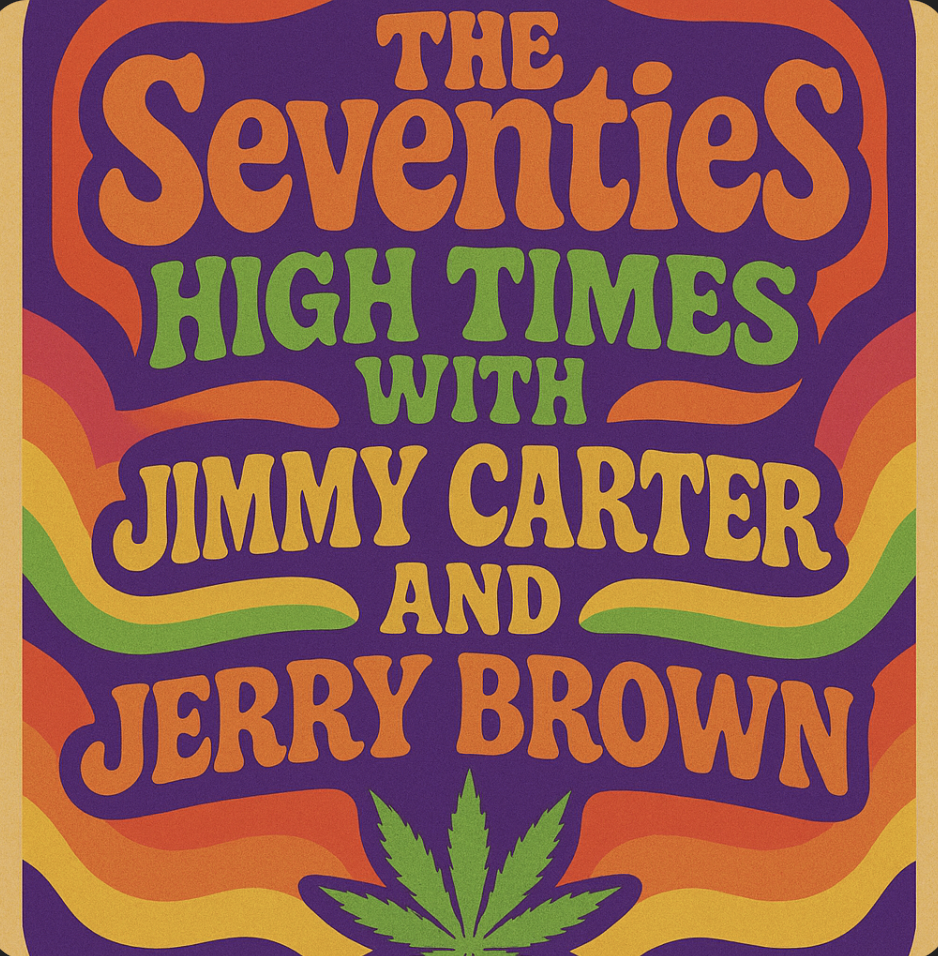The Seventies: High Times with Jimmy Carter and Jerry Brown

Why the War on Cannabis Refuses to Die: A History
For much of the eighteenth and nineteenth centuries, American physicians freely prescribed cannabis to treat a wide range of ailments. But by the mid-twentieth century, federal officials were laying the groundwork for a sweeping criminal crackdown. Cannabis would ultimately be classified as a Schedule I substance, placed alongside heroin and LSD, and transformed into a political weapon that shaped American policy for the next six decades. This seven-part series chronicles the milestones, backlash, and unintended consequences that have shaped the war on cannabis from the 1960s to the present day.
Part One: How Boomers and the Yippies Made Weed Political
Part Two: Nixon Admitted Weed Wasn’t Dangerous, But Killed It to Crush Political Dissent

In the years that followed President Richard Nixon’s crackdown on pot and eventual resignation, state and local governments began to push the envelope to reform cannabis laws.
Five Bucks and a Dream in Ann Arbor
In 1972, the city of Ann Arbor, Michigan, decriminalized cannabis and reduced the penalty to a $5 fine. The law was overturned by a Republican-controlled council the following year but reinstated by voters in 1974.
Oregon Blazes a Trail and the Dominoes Start to Fall
In 1973, Oregon became the first state to decriminalize the possession of small amounts of cannabis, treating it as a civil offense similar to a parking ticket.
By 1976, a year after Nixon resigned in disgrace, seven additional states—California, Alaska, Maine, Colorado, Ohio, South Dakota, and Minnesota—had eliminated criminal penalties for minor possession.
Jerry Brown Lights Up California
In California, the political tide seemed to have turned entirely when Republican Governor Ronald Reagan left office and was replaced in 1975 by Democrat Edmund G. “Jerry” Brown Jr.
Brown was just 36 years old, the youngest California governor in 111 years, and the first major political leader to support decriminalization. During his first year in office, Governor Brown signed the Moscone Act (Senate Bill 95) into law, decriminalizing the possession of small amounts of marijuana in California. The Moscone Act reclassified possession of one ounce (28 grams) of marijuana as a misdemeanor, punishable by a $100 fine, and it also established higher penalties for larger quantities or possession on school grounds.
That same year, California Attorney General Evelle Younger told U.S. News that he believed the votes existed in the state legislature “to eliminate all penalties for marijuana,” and predicted the change would come in 1977.
Yet cannabis arrests continued to climb. In 1976, more than 400,000 Americans were arrested for cannabis-related offenses, most for simple possession.
The Peanut Farmer and the Rock Star
Jimmy Carter, a little-known governor from Georgia, ran a presidential campaign filled with strategic ambiguity, pitching himself as a populist reformer. As Newsweek reported, “His studied ambiguities worked for him in the early primaries, but at the substantial deferred cost of making him look equivocal or worse.”
According to Newsweek: “[H]is pollster, Pat Caddell, warned as early as March that liberals were beginning to say, 'Isn't it amazing how far he's got by saying nothing.'" Carter said he would reform government and the tax code but would offer details after his election.
Newsweek added, "He buried positions in codicils and complications, stressing some to one audience and others to another; he managed as a result to get votes on both sides of issues as visceral as abortion and busing."
On the politics of cannabis, Carter, whose three sons had experimented with marijuana, did make a campaign promise to decriminalize marijuana. He emphasized that decriminalization “is not legalization.”
During the campaign, Carter was invited to a picnic by Capricorn Records, whose founder Phil Walden and star musician Gregg Allman had helped him raise early funds. Advisers warned him to stay away because of Allman’s drug history.
“This isn’t politics, it’s friendship,” Carter replied. “But,” he added with a smile, “let’s go in the early afternoon—there’s no way Greg would be there then.”
Later Carter said, “It was The Allman Brothers helped put me in the White House by raising money when I didn't have any money.”
A Sympathetic White House Opens the Door
When Carter took office in 1977, he was described as being lenient, sympathetic, and in favor of states’ rights. “The Federal Government will watch sympathetically as the States move toward decriminalization of marijuana,” reported US News and World Report in 1977.
The President-elect favors concentrating law-enforcement efforts on serious and violent crimes instead of so-called victimless offenses such as prostitution or public intoxication. He will leave to the State and local authorities the decision of decriminalizing possession of small amounts of marijuana, but believes prosecution should be concentrated on drug pushers. The various federal drug agencies will be combined into a single office under close supervision by the White House.”
Decriminalization Goes Mainstream—For a Moment
In a 1977 message to Congress, Carter said,
“I support a change in law to end federal criminal penalties for possession of up to 1 ounce of Marijuana. Leaving the states free to adopt whatever laws they wish concerning Marijuana.”
"Penalties against possession of a drug should not be more damaging to an individual than the use of the drug itself, and where they are, they should be changed. Nowhere is this more clear than in the laws against possession of marijuana in private for personal use,” the President said, in the most pot-friendly statement any US chief executive has ever issued.
Carter’s position drew support from major institutions. The American Bar Association and the National Council of Churches both endorsed decriminalization.
That same year, Madison, Wisconsin, became the latest city to enact its own reform through a ballot initiative.
The Party Peaks and Fades Fast
By 1979, cannabis use had become ubiquitous. Roughly 50 million Americans had tried the drug—about two-thirds of all young adults. Among 12- to 17-year-olds, the rate of experimentation had climbed from virtually zero in 1960 to nearly 30 percent by the decade’s end.
Undercover narcotics agents reported widespread use among high schoolers from affluent families and described how normalized cannabis buying and selling had become in suburban neighborhoods.

The National Organization for the Reform of Marijuana Laws (NORML) predicted in 1977 that by 1979, half the states would decriminalize cannabis and that the battle would soon shift to full legalization. But they were wrong.
As cannabis use became more common in the late 1970s, the backlash grew even stronger. A conservative resurgence was underway after years of liberal ascendancy. That wave would soon bring former California Governor Ronald Reagan to the White House.
Check out Part Four, "Just Say No: The Political Hit Job That Killed Cannabis."
 Shawn Griffiths
Shawn Griffiths







